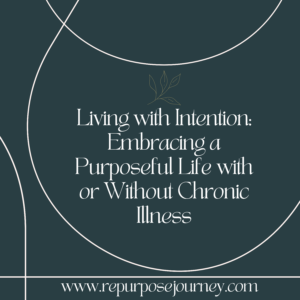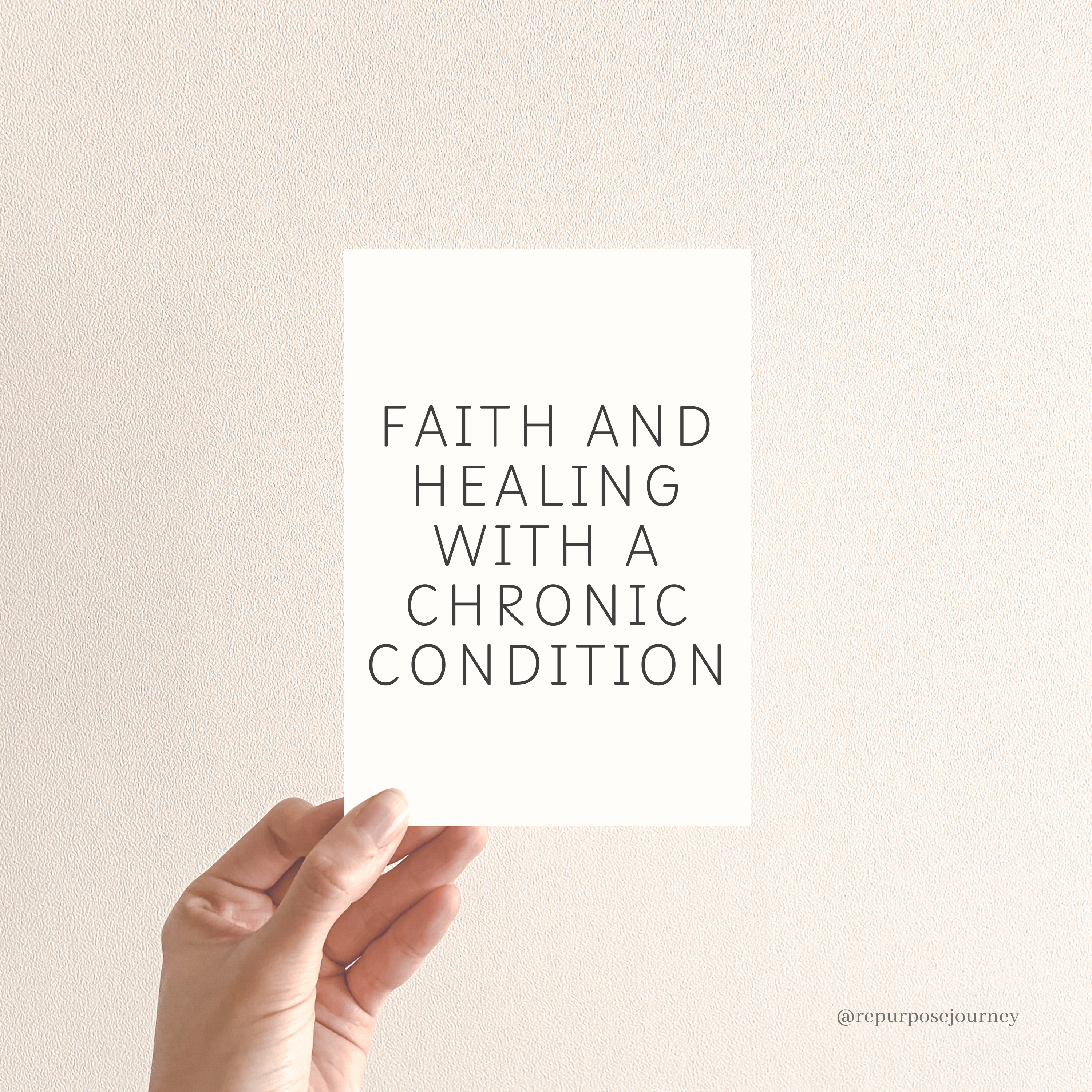Welcome back to Repurpose Journey, where we explore how to navigate life’s challenges with resilience, faith, and purpose. I am writing about how faith can play a significant role in healing and finding peace, even when living with chronic illness.
For those of us managing conditions like Ménière’s Disease, the challenges often feel overwhelming. Beneath those physical symptoms, there’s a deeper emotional and spiritual struggle to stay grounded when life feels uncertain. Today, I’m sharing how faith has been a cornerstone in my own healing journey, offering encouragement for anyone walking a similar path.
When I talk about healing, I’m not just referring to physical recovery. Healing is holistic—it’s about finding peace in your mind, heart, and spirit, even when your body feels broken. For many of us, physical healing may feel distant or out of reach. But emotional and spiritual healing? That’s something we can choose to pursue every day.
For me, faith has been my lifeline. It’s the anchor that keeps me grounded when everything else feels like it’s spinning out of control. On the toughest days—when symptoms flare and doubts creep in—leaning into my faith reminds me that I’m not walking this journey alone. It’s the quiet reassurance that my struggles are seen, my prayers are heard, and my strength comes from something much greater than what I can muster on my own.
This doesn’t mean it’s always easy. There are moments when fear and frustration overwhelm me, when I wonder why this is happening or how much more I can endure. But it’s during those moments of surrender—when I let go of the need to have all the answers—that I experience the peace that only God can provide.
Healing, I’ve learned, is about making space for grace, even in the lowest of lows. It’s about recognizing that our worth isn’t tied to what we can or can’t do on any given day. It’s about finding joy in the small victories and purpose in the journey. Faith doesn’t mean pretending that everything is okay; it means choosing to believe that there’s more to the story, that healing can take many forms, and that even in our weakest moments, we’re never truly alone.
Scripture, prayer, and quiet moments of reflection have become the tools I rely on to reframe my perspective and center myself amidst life’s uncertainties. These practices aren’t just habits—they’re lifelines that help me face the emotional and spiritual challenges of living with a chronic illness. They remind me that while my circumstances may feel overwhelming, there is a deeper source of strength and peace available to me.
One verse that has carried me through countless difficult moments is 2 Corinthians 12:9: “My grace is sufficient for you, for my power is made perfect in weakness.” These words are balm for my soul. They remind me that I don’t have to rely on my own strength, which often feels insufficient. Instead, I can lean into God’s grace, knowing that His power shines brightest in my weakest moments.
This verse has taught me that vulnerability isn’t something to be ashamed of. It’s in those moments of admitting my limits—when I let go of control—that I experience the fullness of God’s grace. It’s not about fixing myself or pretending to have it all together; it’s about trusting that His strength will carry me when I can’t take another step on my own.
Prayer, for me, is an ongoing conversation with God—a safe space where I can pour out my fears, frustrations, and hopes. Sometimes it’s a whispered plea for help, and other times, it’s a moment of gratitude for strength I didn’t even know I had until I needed it. Quiet reflection allows me to reconnect with His promises, even when everything around me feels chaotic.
Through it all, this verse reminds me that weakness doesn’t disqualify me; it positions me to receive God’s strength in ways I never imagined. It’s in these moments of surrender that I find the courage to keep moving forward, knowing I’m held by a power far greater than my own.
Living with a chronic illness is unpredictable. There’s no way to plan for when symptoms will flare up or how they’ll impact your day. For me, Ménière’s Disease doesn’t follow a schedule or ask permission to interrupt life. A day that begins with hope and energy can suddenly spiral into dizziness, tinnitus, or overwhelming fatigue. This unpredictability can cast a constant shadow over life, making it hard to plan, pursue goals, or even feel like yourself.
But it’s not just about the physical symptoms. The emotional toll is just as real. Plans are often derailed at the last minute, causing guilt and frustration. Relationships can become strained as loved ones struggle to understand what you’re going through. And when so much energy goes into simply managing the day-to-day, your sense of identity can feel fragile.
Here’s what I’ve come to understand: peace isn’t about controlling the storm. It’s about finding calm within it. I used to think that I had to fight against my illness, outsmart it, or somehow beat it. But over time, I’ve realized that true peace comes from letting go of control and focusing on how I respond.
Finding calm doesn’t mean pretending everything is okay or denying the difficulties. It means creating space for grace—taking deep breaths, centering yourself, and anchoring your thoughts in something bigger than the chaos. For me, this has meant leaning into my faith, practicing mindfulness, and focusing on what I can do, not just what I can’t.
When I stopped trying to control every moment and instead focused on being present, I found peace even in the midst of uncertainty. It wasn’t about the storm disappearing; it was about realizing that I had the strength, tools, and support to weather it.
Chronic illness has a way of stripping away the things we once defined ourselves by. Our careers, hobbies, and roles within our families or communities—all of these things can feel like they’re slipping away as our energy goes toward doctor’s appointments and managing symptoms.
This loss of identity can be one of the hardest parts of living with a chronic illness. You might ask yourself, “Who am I now?” or “What do I have to offer when I can’t do the things I used to do?” It can feel like your illness is taking up so much space in your life that there’s little room for the things that once brought joy or purpose.
But here’s what I’ve learned: Chronic illness may change your circumstances, but it doesn’t change the essence of who you are. You are still the person who loves deeply, dreams big, and carries a unique purpose. Your worth isn’t determined by what you can do in a day. It’s found in who you are, not in what you accomplish.
Rediscovering your identity may look different now, but it’s still yours. It might mean embracing new ways to connect with your passions, finding new roles, or learning to see yourself through the lens of strength and resilience. Your identity isn’t gone—it’s evolving, and your journey is still meaningful.
Practical Steps to Strengthen Your Faith
If you’re wondering how to lean into faith during tough times, here are a few practices that have helped me:
- Start your day with prayer or reflection. Just a few minutes can set a positive tone.
- Keep a gratitude journal. Write down something you’re thankful for each day, even when it’s hard.
- Find a verse or mantra to hold onto. Mine is 2 Corinthians 12:9. Find one that resonates with you.
- Connect with a faith-based community. Whether it’s a group, Bible study, or online network, sharing faith with others is uplifting.
- Practice surrender. Letting go of what you can’t control can bring immense peace.
Encouragement for Your Journey
If you’re walking this path with a chronic illness, I want you to know this: your struggle is real, but so is your strength. Faith doesn’t erase the challenges—it gives us the courage to face them. You are not defined by your illness. You are a child of God, deeply loved, and full of purpose.
Thank you for joining me here at Repurpose Journey. I hope this has encouraged you and reminded you of the power of faith in life’s storms.
Until next time, take care of yourself, and remember—you are never alone on this journey.



